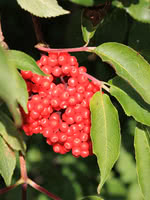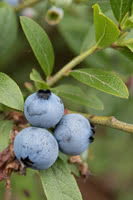Mon-Fri 9am - 5pm Mountain time
Red Elderberry vs Lowbush Blueberry
Sambucus racemosa
Vaccinium angustifolium
NOT AVAILABLE THIS SEASON - MIGHT RETURN
Red Elderberry is an attractive, medium-sized deciduous shrub.
It produces clusters of white flowers in the spring and bright red berry-like drupes, which provide beautiful contrast against its coarse, textured green foliage.
Red Elder can be pruned as a small single or multi-stemmed tree.
Lowbush Blueberry, commonly known as the Wild Lowbush Blueberry, is often wild-harvested and thrives in low pH acidic soil. This early low-bush blueberry produces white and pink bell-shaped flowers in the spring. Its fruit is smaller in size than high bush blueberry plants and is more flavourful with an intense blueberry taste-masking it perfect for fresh eating, baking, and preserves.
Note: Blueberries require very specific soil conditions. They need well-drained soil with a pH between 4.5 and 5.0. If the starting pH of your soil is between 5.1 and 6.2 you can lower it by adding sulfur. We recommend against planting blueberries in soil with a starting pH greater than 6.2. Please do your own research before buying any blueberry plants.
Red Elderberry Quick Facts
Lowbush Blueberry Quick Facts
Toxicity: toxic to humans

